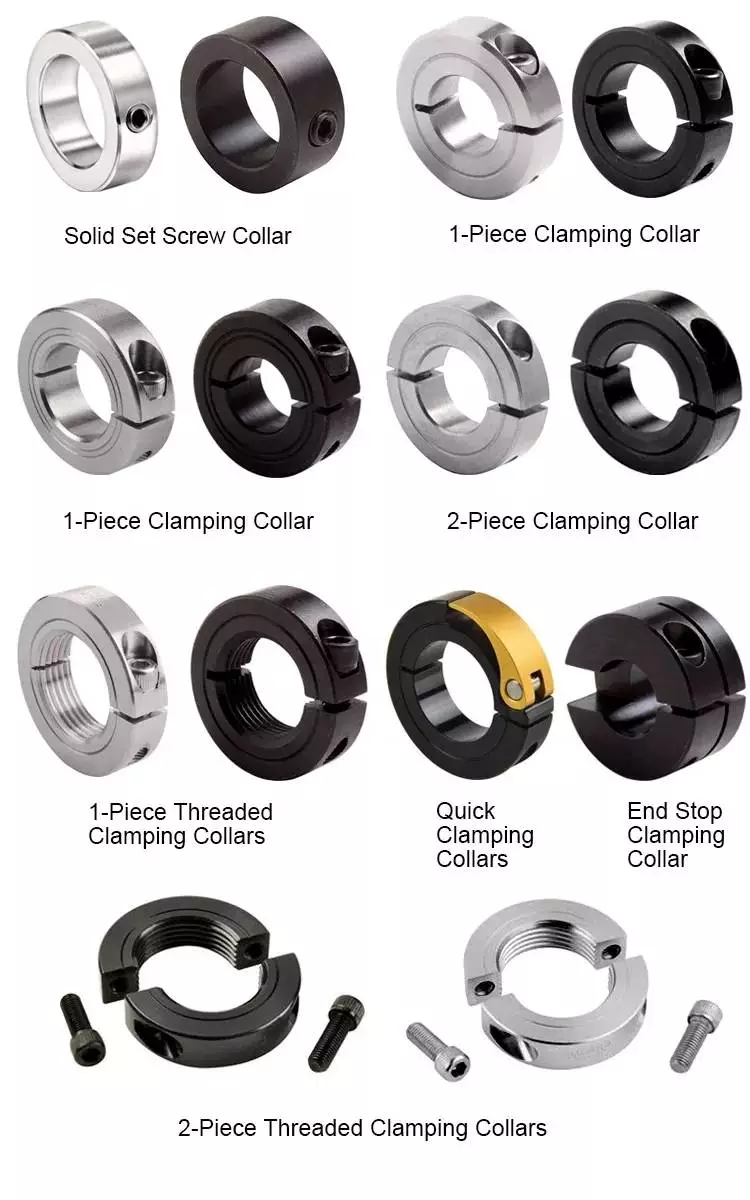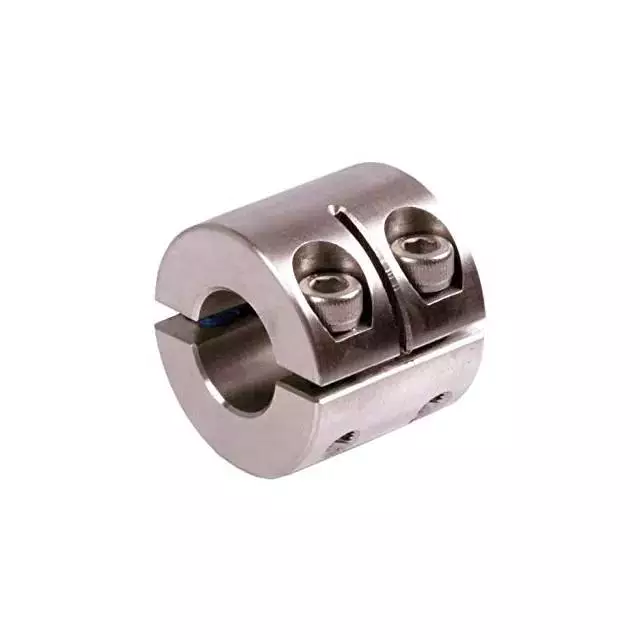
Can I purchase shaft collars with specific certifications for certain industries?
Yes, it is possible to purchase shaft collars with specific certifications for certain industries. Certifications ensure that the shaft collars meet specific standards, requirements, or regulations established for particular industries or applications. Here are some important points to consider when purchasing shaft collars with specific certifications:
- Industry-Specific Certifications: Different industries may have specific certifications or standards that shaft collars need to meet to ensure compliance with safety, performance, or regulatory requirements. For example, industries such as automotive, aerospace, food processing, medical, or oil and gas may require shaft collars that meet certifications such as ISO 9001 (quality management system), ISO 14001 (environmental management system), AS9100 (aerospace quality management system), or FDA (Food and Drug Administration) compliance. Identify the specific certifications relevant to your industry and application.
- Manufacturer Certifications: Some manufacturers specialize in producing shaft collars that are certified for specific industries or applications. They may have their own certifications or comply with industry-specific standards. When purchasing shaft collars, look for manufacturers who have the necessary certifications and a track record of producing compliant products. Their certifications should be prominently displayed on their website, product documentation, or available upon request.
- Product Documentation and Specifications: Shaft collar manufacturers often provide product documentation, specifications, or datasheets that outline the certifications and standards their products comply with. These documents may include information about industry-specific certifications, material certifications (such as RoHS compliance for restricted substances), or performance ratings. Review the product documentation carefully to ensure the shaft collars meet the necessary certifications for your industry or application.
- Supplier Verification: If you are purchasing shaft collars from a supplier or distributor, verify that they source their products from reputable manufacturers who adhere to industry-specific certifications. Request documentation or certifications from the supplier to confirm compliance. It is essential to ensure that the entire supply chain, from the manufacturer to the supplier, maintains the necessary certifications required for your industry.
- Consultation with Industry Experts: If you have specific certification requirements for your industry or application and are unsure about the available options, it is advisable to consult with industry experts or engineers specializing in that field. They can provide guidance on the certifications needed and recommend suitable shaft collar manufacturers or suppliers who can meet those requirements.
When purchasing shaft collars with specific certifications, it is important to verify the authenticity and validity of the certifications. Look for reputable manufacturers, suppliers, or distributors who have a proven track record of delivering certified products and maintaining compliance with industry standards. The certifications provide assurance that the shaft collars meet the necessary quality and safety standards for your industry or application.

Where can I find information on the materials used in manufacturing shaft collars?
If you are looking for information on the materials used in manufacturing shaft collars, there are several sources where you can find relevant information. Here are some common resources to consider:
- Manufacturer Websites: Many manufacturers of shaft collars provide detailed information about the materials they use in their product specifications or technical datasheets. Visiting the websites of specific collar manufacturers and exploring their product documentation or resources section can help you find information about the materials used in their collars. This information may include the type of material (such as steel, stainless steel, aluminum, or plastic) and any specific properties or characteristics associated with the material.
- Product Catalogs and Brochures: Manufacturers often publish product catalogs or brochures that provide an overview of their collar offerings. These catalogs may include information about the materials used in manufacturing the collars. You can request catalogs from manufacturers directly or check their websites for downloadable versions. The catalogs may highlight the material properties and advantages of using specific materials for different applications.
- Material Databases: Online material databases or directories can be valuable resources for finding information about specific materials used in manufacturing shaft collars. These databases typically provide comprehensive information about various materials, including their composition, mechanical properties, corrosion resistance, temperature tolerance, and other relevant characteristics. Examples of such databases include MatWeb, Engineering Toolbox, or specialized materials databases maintained by industry organizations or universities.
- Technical Standards and Specifications: Technical standards and specifications related to mechanical components can often include information about the materials used in their construction. Standards organizations or industry associations may release documents that outline the material requirements for shaft collars or provide guidelines for material selection. Accessing these standards or specifications can provide insights into the recommended materials for shaft collar manufacturing.
- Consulting with Manufacturers or Suppliers: If you have specific questions about the materials used in manufacturing shaft collars, reaching out directly to manufacturers or suppliers can be beneficial. They can provide detailed information about the materials they use, including their composition, properties, and any specific treatments or coatings applied to enhance performance. Contacting manufacturers or suppliers allows for direct communication and the opportunity to address any specific concerns or requirements you may have.
When seeking information on materials used in shaft collar manufacturing, it is important to consider factors such as desired properties (e.g., strength, corrosion resistance), environmental compatibility, and application-specific requirements. This will help you make informed decisions about selecting shaft collars that are suitable for your specific needs and operating conditions.

What are the key features to consider when selecting shaft collars for specific machinery?
When selecting shaft collars for specific machinery, there are several key features to consider. These features help ensure that the chosen shaft collars are compatible with the machinery and can perform effectively in the intended application. Here are the key features to consider:
- Shaft Size and Material: The first consideration is the size and material of the shaft. Shaft collars are available in various sizes to accommodate different shaft diameters. It is crucial to accurately measure the shaft diameter and choose a collar that matches it. Additionally, consider the material of the shaft, such as steel, stainless steel, or aluminum, and select a collar material that is compatible with it to prevent galvanic corrosion or other compatibility issues.
- Collar Material: Shaft collars are available in different materials, including steel, stainless steel, aluminum, and plastic. The choice of collar material depends on factors such as the application environment, load requirements, and desired durability. For example, stainless steel collars are often preferred for corrosive or high-temperature environments, while plastic collars may be suitable for lighter-duty applications or situations where avoiding marring or scratching the shaft is important.
- Collar Type: Consider the type of collar that best suits the specific machinery and application. The common collar types include set screw collars, clamping collars, one-piece solid collars, two-piece split collars, threaded collars, hinged collars, flanged collars, and specialty collars. The choice depends on factors such as ease of installation, adjustability, space limitations, and the need for specific features like indexing, quick release, or torque limiting.
- Load Capacity: Evaluate the load capacity requirements of the machinery. The shaft collars should be capable of withstanding the expected loads and forces without deformation or failure. Consider factors such as the torque, axial force, and radial force that the collar will experience in the application and choose a collar with an appropriate load rating to ensure reliable and safe operation.
- Operating Conditions: Take into account the operating conditions in which the machinery operates. This includes factors such as temperature, humidity, vibration, and exposure to chemicals or contaminants. Ensure that the chosen shaft collars are designed to withstand these conditions and have appropriate corrosion resistance, temperature tolerance, and environmental sealing if needed.
- Installation and Adjustment: Consider the ease of installation and adjustment of the shaft collars. Some collars, such as set screw collars, are relatively easy to install and require minimal tools. Others, like clamping collars, may require more complex assembly or adjustment procedures. Choose a collar that aligns with the available installation and adjustment methods in your machinery and suits the desired level of convenience or precision.
- Compatibility with Other Components: Assess the compatibility of the shaft collars with other components in the machinery, such as bearings, gears, pulleys, or couplings. Ensure that the collar design and dimensions allow for proper alignment, clearance, and interaction with these components. Consider any specific requirements or constraints imposed by the machinery design or the need to interface with existing components.
- Cost and Availability: Finally, consider the cost and availability of the chosen shaft collars. Compare prices from different suppliers or manufacturers to ensure that the collars offer good value for money. Additionally, assess the availability of the collars from reliable sources to avoid delays or difficulties in obtaining replacements or additional collars when needed.
By carefully considering these key features, you can select shaft collars that are well-suited for the specific machinery, ensuring proper functionality, reliable performance, and compatibility with the application requirements.


editor by Dream 2024-04-19